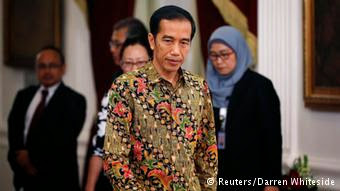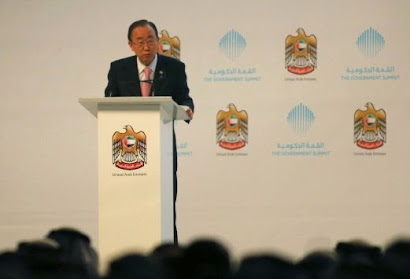Yahoo – AFP,
Kiki Siregar, September 22, 2017
 |
A tableau of white sandy beaches, colourful coral reefs and turquoise water, the
islands of Raja Ampat are set to be Indonesia's next tourism hotspot -- but locals
fear the government is failing both them and the environment in its development
push (AFP Photo/GOH CHAI HIN) |
Raja Ampat
(Indonesia) (AFP) - A tableau of white sandy beaches, colourful coral reefs and
turquoise water, the islands of Raja Ampat are set to be Indonesia's next
tourism hotspot -- but locals fear the government is failing both them and the
environment in its development push.
Stretching
across 67,000 square kilometres in Indonesia’s far east, the picture-perfect
islands might be as close to paradise as visitors can find.
"It’s
amazing. We’ve been to millions of islands and I would say it’s the most
beautiful one," Canadian Angelika Redweik-Leung said at a lookout above
the Pianemo island group.
Raja Ampat
-- which means Four Kings -- is made up of 1,500 islands and is home to about
1,400 varieties of fish and 600 species of coral -- making it one of the most
biodiverse marine habitats on earth.
Indonesia's
government is intent on turning the area into a tourism hotspot, building
hotels, restaurants and investing in new harbours.
But on a
palm-fringed island about two hours boat ride from Raja Ampat's capital Waisai,
villagers still live in simple huts that lack electricity and clean water,
while the nearest high school is scores of miles away.
 |
Locals in
Indonesia's Raja Ampat told AFP they had seen no improvements to their
lives
despite the dramatic rise in visitors. According to government estimates around
15,000 tourists now come to the area each year -- up from less than 5,000 in
2010
(AFP Photo/GOH CHAI HIN)
|
Locals told
AFP they had seen no improvements to their lives despite the dramatic rise in
visitors. According to government estimates around 15,000 tourists now come to
the area each year -- up from less than 5,000 in 2010.
"They've
hurt us indigenous people. They took our land, our water and our forest. We
feel betrayed," Paul Mayor, chief of the island's Byak Betew tribe, said
of the government's tourism drive.
"That's
our land, our ocean, which now is a world-class tourist destination, but we've
gained nothing from the influx of tourists," he added.
Mayor also
criticised authorities for failing to properly protect the area's unique
ecosystem, pointing to a catastrophic cruise ship crash in March, which damaged
13,500 square metres of pristine coral reef.
The
4,200-ton Caledonian Sky ran aground near the island of Kri carrying 102
passengers and 79 crew, but half a year later no one has been held accountable.
 |
Raja Ampat
-- which means Four Kings in Indonesian --- is made up of 1,500 islands
and is
home to about 1,400 varieties of fish and 600 species of coral -- making it one
of the most biodiverse marine habitats on earth (AFP Photo/GOH CHAI HIN)
|
'We are
still poor'
Researchers
from the University of Papua, who assessed the impact of the accident, said
restoring the damaged reef could cost as much as $16.2 million.
The head of
tourism for Raja Ampat, Yusdi Lamatenggo, said the company operating the boat
-- Noble Caledonia -- will be summoned to appear in court soon but so far they
have not accepted responsibility or paid any damages.
In the
meantime, he told AFP, steps were being taken to prevent further accidents by
establishing clearly demarcated cruise ship routes and world-class harbours.
But the
accident has fuelled feelings of mistrust and exclusion often felt by Papua's
indigenous Melanesian population. The resource-rich region was annexed by
Jakarta in 1969 and most Papuans feel they have not been given an even share of
its natural riches.
The
military retains heavy influence in the region and regularly stifles dissent.
After
taking office in 2014, president Joko Widodo pledged to speed up development in
Papua, but many locals insist they have been forgotten.
"There
has been no change," Ariel Fakdawer, head of Saukabu village in Raja Ampat
told AFP.
 |
"They've
hurt us indigenous people. They took our land, our water and our forest.
We
feel betrayed," Paul Mayor, chief of the island's Byak Betew tribe, said
of the
government's tourism drive (AFP Photo/GOH CHAI HIN)
|
"The
yearly Raja Ampat festival, for example, attracts thousands of tourists but we
gain nothing from that. We are still poor, but the organizers of such
festivals, outsiders, they have made a fortune," he added.
Indigenous
groups say they need communication satellites, electricity, better
infrastructure, and the right to govern themselves by customary law.
"The
government never fulfils our needs because they don't understand what we
want," chief Mayor said.
"I
believe the government has to approach us by bearing in mind our cultural
needs. They have to talk to us indigenous people," he insisted.
But not
everyone is against the rush to open up Raja Ampat to the world.
Villager
Medzke Karoswaf explained: "This is a modern world. We cannot live
isolated like in a cave forever. We have to be open-minded. Like it or not, we
don’t live alone in this world."






















